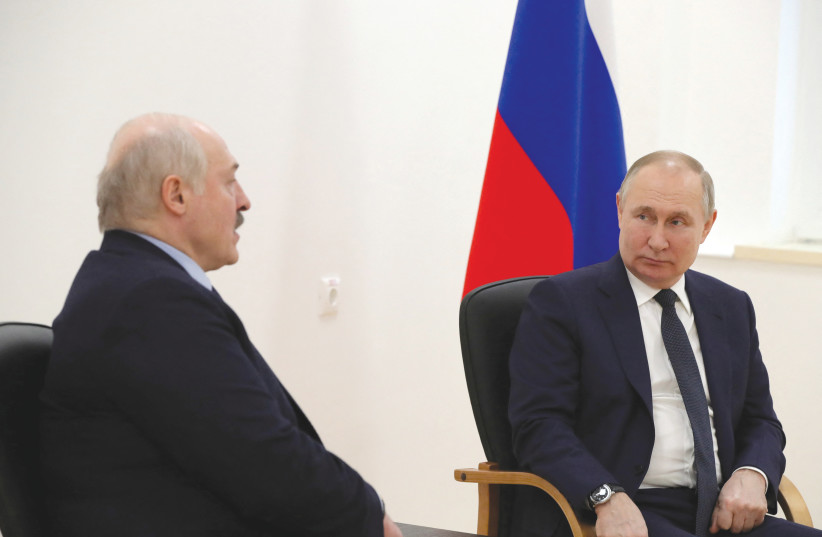Before Russian President Vladimir Putin launched his disastrous war on Ukraine, he called for two meetings: one with Chinese President Xi Jinping and the other with Azerbaijani President Ilham Aliyev. Putin’s choice of collaborators was not accidental.
Amid deteriorating relations with the West, Putin’s outreach to these two authoritarian leaders aimed to reaffirm support for a shared worldview. With China, Russia aimed to show the West a united front against what both consider negative American influence in Europe and the Asia-Pacific region.
With Azerbaijan, Putin signed a bilateral agreement of allied cooperation. It allows for deepened political, economic and military relations including the possibility of providing each other with military assistance. This deal may have been somewhat coerced by Russia to gain some control over Azerbaijan’s energy exports to mitigate the expected Western sanctions on Russia for attacking Ukraine, but it reflected ideological alignment that is bigger than these two countries alone.
Today’s global landscape is increasingly shaped by a league of authoritarian leaders like Putin, Jinping, Aliyev and their fellow travelers. There are those in Israel who are no strangers to this worldview. Wherever they are in the world, they all understand one another and operate in similar ways – politics are top-down, financial processes opaque and repression of dissent at home de rigueur. Like Putin, Aliyev’s father was a KGB member; they see the world in much the same way.
This new League of Autocrats share political methods for staying in power, honed and refined in their states, as well as financial resources to strengthen elites and help shield them during times of political turmoil. These interactions create opportunities that open access to financial redistribution, create market access and provide club goods to ensure the loyalty of the coalition.

The relationship between Aliyev and former US president and would-be autocrat Donald Trump is a reflection of this at the highest level. Aliyev’s daughter Leyla Aliyeva, whose selfies during her father’s speech at the 2017 UN General Assembly gained notoriety, was married to Emin Agalarov, singer and son of Aras Agalarov, a billionaire Russian real estate magnate.
Trump worked with the Agalarovs on several business ventures, including one for building a Trump Tower in Moscow, which failed. It was after Aras Agalarov met with Yury Chaika, the prosecutor general of Russia, that the Agalarovs arranged the notorious June 2016 Trump Tower meeting with reported assurance to deliver information that would incriminate Hillary Clinton ahead of the American elections.
Emin’s agent, Rob Goldstone, wrote to Donald Trump Jr. that the information was “part of Russia and its government’s support for Mr. Trump – helped along by Aras and Emin.” While countries do business all the time, the difference here is that authoritarians’ deal-making has deleterious consequences for democratic states.
Authoritarian regimes around the world have been increasing in number, and enemies of liberal democracies have consolidated. Freedoms across the world have been declining and by some measures only around 20% of the global population live in free countries.
Illiberal forces have also been damaging democracies from within. This was evident in 2021 when supporters of then-president Donald Trump attacked the US Capitol in Washington on January 6, in order to overturn the results of the presidential election. Many state leaders, elected in democratic elections, have also begun undermining and corrupting the very institutions that brought them to power.
This state of affairs threatens democracies across the globe, and should raise alarms among all who values their own rights and the rights of fellow human beings.
It is the fundamental divide of the 2020s: a genuine ideological rupture between democratic and authoritarian systems of government. The authoritarians are more nimble and ruthless. They are also unfree and can make terrible mistakes because few dare challenge a despot.
The decline of democracy has already damaged the rule of law and destabilized markets across the world. The resulting fracture of shared values across democracies has led to a decline of these values globally, with these norms increasingly questioned and challenged.
The US must address its own polarization to restore trust in American institutions and in democracy itself. President Joe Biden has made strong declarations on democracy and human rights, but must do more to ensure that his actions align with his rhetoric to succeed over those who are bent on obstructing him. Antidemocratic allies are intrinsically less reliable in supporting US interests and as a matter of national security, the US must commit to bold, specific and measurable actions at home and abroad.
The current sanctions against Russia are not enough – the transnational corruption and kleptocracy that props up illiberal powers must be targeted. Ideally, it should extend beyond Russia. There is no reason for the West to enable a destructive kleptocrat like Aliyev.
President Biden has strongly stated that corruption is a threat to democracy. It is critical, that the US and other democratic governments like Germany, England, Israel and France enact foreign policies that prioritize support for democracy above other efforts.
The writer, a California state senator, is the chair of the Senate Committee on Appropriations and represents the 25th Senate District, home to approximately one million people.
